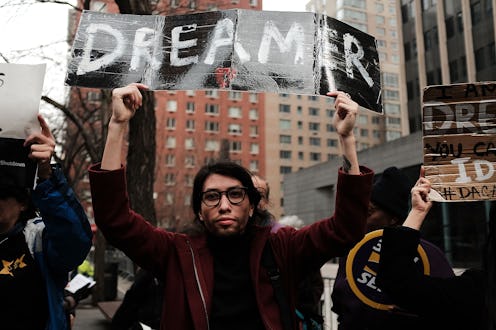
On Tuesday evening, a federal court judge's DACA ruling called out the Trump administration for failing to provide an acceptable reason for ending the program. DACA, or the Deferred Action for Childhood Arrivals program, allows undocumented who came to the United States as children to receive renewable reprieves from deportation — and authorization to work in the United States. Back in September, the Trump administration announced it would be ending DACA and characterized the program as unconstitutional. The new ruling, however, means the government will have to keep it alive, unless it can provide a better reason over the next 90 days for canceling it.
As Politico reported, U.S. District Court Judge John Bates ruled that the legal explanation for ending DACA that was provided by the Department of Homeland Security (DHS) was not sufficient to justify eradicating the program. As Bates wrote in his opinion (as reported by Politico), "DACA’s rescission was arbitrary and capricious because the Department failed adequately to explain its conclusion that the program was unlawful."
Bates is now the third federal judge who has rejected the Trump administration's legal justification for ending DACA. While the administration technically ended the DACA program in March, the government has continued to renew applications for existing DACA recipients, as required by court orders.
According to The Hill, the first two federal judges ruled that DACA must only continue (in the form of offering renewals for existing recipients) until the litigation involving the program wraps up. However, Bates ruled that DACA must not only continue, but that the program must also accept new applicants — something which was not mandated by previous rulings. However, Bates' ruling is stayed for 90 days — the length of time which he has given the Trump administration to improve its legal arguments in the case.
As the Chicago Tribune explained, if the government does not provide a sufficient legal explanation for ending the program within 90 days, then Bates' ruling will go into effect and the “DHS must accept and process new as well as renewal DACA applications.”
As CNN noted, in announcing an end to DACA back in September, the Trump administration had framed the program as illegal. The administration essentially argued that it was preemptively shutting the program down, before it would inevitably be shut down by the court system. However, as CNN pointed out, thus far no court has found that DACA is unconstitutional. Moreover, DACA proponents assert that Tuesday's ruling further emphasizes that there is no legal issue with the program.
Indeed, Ali Noorani, the executive director of the National Immigration Forum, expressed these sentiments to the New York Times on Tuesday, saying:
This decision verifies the Trump administration failed to prove the DACA program is illegal ... Either President Trump finds another way to end the program, tossing hundreds of thousands of young people into deportation proceedings, or he works with Republicans and Democrats to find a legislative solution that secures our border and ensures Dreamers continue contributing to our economy.
As WRAL reported, around 700,000 individuals have signed up for DACA since it was implemented in 2012. A poll conducted in January of 2018 showed that the vast majority of Americans support those protected by the DACA program. The CBS poll revealed that almost nine out of 10 respondents said they believe that Dreamers (the word often used to described DACA recipients) should be allowed to remain in the United States if they meet particular requirements, like attending school or working.
The Trump administration has not yet commented publicly on the most recent court ruling. Many, especially Dreamers, will undoubtedly be anxiously waiting to see if and when the government offers new arguments in the case — and whether or not Bates' decision to fully revive the program will actually take effect.